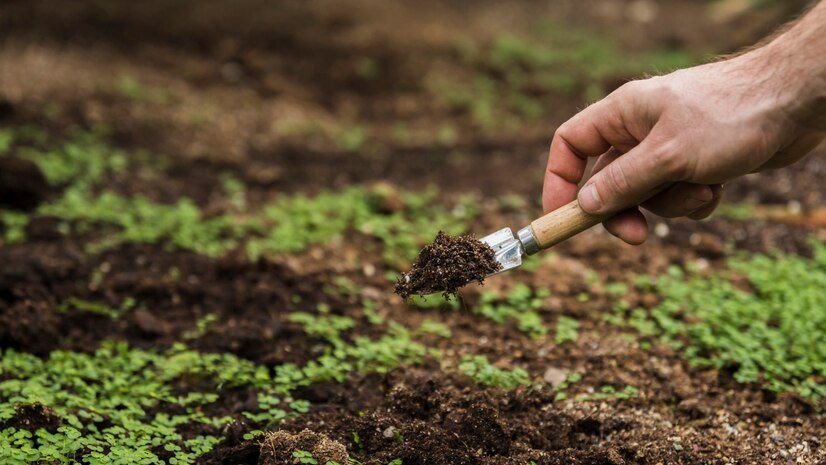Organic Fertilizer: The Eco-Friendly Nourishment for Healthy Plants
Organic gardeningWorried about the health of your garden’s soil and plant?
Looking for a fertilizer that’s better for both your plants and planet then it’s time to explore the natural world of organic fertilizers.
emphasizes on nourishing your garden through ingredients that support healthier soil, greener plants and beneficial insects.
This is achieved by avoiding synthetic fertilizers and pesticides.
By opting organic gardening you contribute to creating a balanced ecosystem where plants thrive naturally. In this article learn all about the benefits of organic fertilizers, that nourishes plants,preserves nature and saves the planet with its eco-friendly nature.
To make your organic journey more natural and fruitful, here is a step by step guide that offers following features
Introducing Organic Fertilizer
Organic fertilizers also known as natural fertilizers are made from plants, animals or minerals that provide all essential nutrients to plants. Some commonly used organic fertilizers include compost, rock powder and manure. A fertilizer will only be considered natural /organic only if its material occurs naturally in the environment.
-
Efficacy
Despite being highly effective, organic fertilizers are time taking boosters. Unlike synthetic fertilizer,organic fertilizers provide a gradual, yet permanent solution to the success of your plant. They basically depend on moisture and beneficial microorganisms that decompose in soil, releasing nutrients for plants..
-
Why Opt Organic Fertilizer For Your Garden?
In past years the use of synthetic/inorganic fertilizer although boosted plants health and crop yields in a short time but its heavy chemicals damaged soil fertility for a long-time to cope up, farmers used even heavier chemicals,creating a harmful cycle that often ends in barrenersss. In such suitable organic fertilizers are the ultimate natural recipe to natural health.
-
How to create Organic Soil?
Organic products are the best choice for your garden. They enrich soil, creating a sustainable growth that enhances soil fertility.
To make an organic, healthy soil begin with native soil incorporated with compost, manure or decomposed leaves to enrich nutrients and enhance soil health.
These natural supplements are rich in microbes that release nutrients gradually, offering your plants strength defense against pest attacks and diseases. Prefer using organic additives like earthworm casting, that conditions your soil with organic matter, effective microorganisms and humic acids.
Kitchen scapes, yard waste,kelp meal and green sand can act as natural boosters to your organic fertilizers.
Rotating crops along with avoiding monoculture planting will help in preventing nutrient depletion of soil.
Organic Fertilizers VS Synthetic Fertilizers
Synthetic fertilizers/inorganic fertilizers are artificially created elements whose composition contains heavy chemicals. Although they give quick results, these benefits are short-lived. Their constant concentration dissolves quickly in water resulting in quick absorption. Their heavy chemicals consequently decrease soil fertility.
On the other side Organic fertilizers are natural materials that support the health of both plants and crops by preserving soil’s fertility. Though they are a bit more expensive and time taking options than synthetic fertilizers, they provide long- term benefits.
Choosing Best Type of Organic Fertilizers
Unlike all-purpose synthetic fertilizer, organic fertilizers are designed to address particular needs, offering a variety of natural ingredients that provide nourishment to your garden’s soil. But when it comes to choosing the best organic fertilizer,confusion arises what to choose? What will suit my garden?
To erase this confusion of selecting among plenty of options, here is a step by step guide to all the various types of organic fertilizers to assist you in beneficial fertilizing of your organic garden soil.
Animal-based Fertilizers
Animal-based fertilizers like bone-meal, blood-meal and manure contain high concentration of nitrogen, which promotes strong early growth of leafy plants. Nitrogen helps the nurturing of young leafy supling in its early week of growth. By-products of slaughter houses and animal waste are its major sources. Some other important animals-based fertilizers on list are:
- Bone meal : Rich source of calcium and phosphorus helps support root development and flowering.
- Blood meal : Rich source of nitrogen, enhances lush green development
- Bat guano : Rich source of all macronutrients, including healthy ratio of NPK (8-5-1.5),promotes overall plant health.
- Poultry Litter : High source of NPK, offering 13 essential organic nutrients for plants
- Horse manure : Nitrogen-rich fertilizer
- Urine : Major source of all macronutrients
- Feather meal : A gradual source of nitrogen.
- Fishery by products: Provides nitrogen, phosphorus, potassium along with trace elements. These include fish meals. Fish powder, fish emulsion and hydrolyzed liquid fish( a fast acting organic liquid)
- Manure Tea : An ideal organic fertilizer for plants health cow manure is particularly a popular choice as organic fertilizer because of its balanced nutritional composition.
- Worm Casting: super food for plants, helps in breakdown of organic matter and enhances the process.
Cow manure is particularly a popular choice as organic fertilizer because of its balanced nutritional composition.
Plant- Based Fertilizer
Plant-based fertilizers, created from agricultural leftovers, break down quickly to provide all essential supplements to crops. They also contribute to improving soil structure, making it a smart and ideal choice for fields with poor drainage or low moisture retention.
Here are some important plant-based organic fertilisers that help boosting your plant’s health:
- Compost: Slow-release, low nitrogen, phosphorus, and potassium, applied in bulk.
- Corn Gluten Meal: Slow-release nitrogen, ideal choice for leafy vegetables.
- Alfalfa Meal/Pellets: Rich in potassium and nitrogen, commonly weed-free.
- Soybean Meal: High in nitrogen, often around 7%.
- Cottonseed Meal: Ideal blend of macro/micronutrients and lowers soil pH.
- Peat: Helps balance soil pH and adds magnesium and calcium.
- Ash: Great potassium source, treats acidic soils.
- Seaweed/Kelp: Supplies macro/micronutrients and natural growth hormones.
Mineral-Based Fertilizer
Mineral-based fertilizers are natural products obtained from mined minerals that provide nutrients and supplements that aid in adjusting soil pH for healthy plant growth.
Some important mineral-based fertilizers are:
- Rockdust: Finely ground rock that improves soil health with minerals.
- Limestone: High in calcium carbonate, decreases soil acidity and boosts soil fertility.
- Greensand: Rich source of potassium, used alone or in fertilizer mixes.
- Natural Potassium Sulfate: High in potassium and sulfur, perfect choice for chloride-sensitive crops.
- Rock Phosphate: Affordable, slow-release source of phosphorus.
- Langbeinite: Supplies potassium, magnesium, and sulfur to plants.
Advantages Of Using Organic Fertilizers
The shift towards organic fertilizing of soil has gained popularity as a result of rising awareness of the environmental dangers and damages caused by chemical fertilizers. Organic fertilizers proved to be nutritious food for plants because of their natural decomposition that makes them easily digestible for plants resulting in enhanced development.
Here we highlighted some major benefits of organic gardening.
- Eco-Friendly : Natural organic or organic fertilizers make them eco-friendly. Also helps in reducing pollution by depending on fossil fuels.
- Improved Soil Quality : Improves water retention and lightens soil structure
- Gradual Nutrient Release: Offers gradual release of nutrients overtime, ensuring long lasting nourishment.
- Low Risk of Over Fertilization : Organic substances are absorbed slowly by plants, unlike synthetic fertilizers.
- Enhance Sustainability: Organic compounds are transformed from organic waste that results in contribution to waste reduction.
- Boost Soil Ecosystem: Organic fertilizers support beneficial microbes and bacteria that help in nutrient breakdown .
- No Chemical Residue: Natural fertilizers break down, leaving no harmful chemical on soil.
- Lower Risk of Runoff: Are organic compounds have lower chances of leaching into waterways, reading environmental pollution.
- Enhances Long- Term Health of Plants: Unlike synthetic fertilizers,these improve soil fertility and quality ensuring long-term health benefits of plants.
Disadvantage of Using Organic Fertilizer
After going through an abundant amount of benefits, the question arises: Are there any disadvantages of using organic fertilizers?
So, the major problem faced by farmers is to balance the nitrogen, phosphorus, and potassium (NPK) ratio because of varying nutrient levels of ingredients found in organic material. They commonly contain less amount of nitrogen and phosphorus as compared to synthetic fertilizers.
Popular solution is to use manure-based fertilisers, which themselves contain a balanced amount of nutrients.
Some noticed drawbacks of organic fertilizers are:
- Inconsistent nutrient levels
- Slow effect on plants but long lasting results
Organic Pest and Disease Control
Organic gardening takes a considerate approach towards disease control and pest management by using gentle control methods. An effective strategy is regularly inspecting plants for any pests, issues or damaged areas and then removing them by hand. This method is helpful for localized problems, offering targeted solutions.
Organic gardening also uses exclusion techniques, like covering plants with lightweight row covers,to protect them from diseases and pests.
FAQS
What is an organic fertilizer?
Organic fertilizer is made from natural materials like plants, animals, or minerals and provides nutrients to improve soil and plant health.
What does organic based fertilizer mean?
Organic-based fertilizer contains primarily natural ingredients but may include small amounts of synthetic additives.
What are organic fertilizers and their benefits?
Organic fertilizers are natural products that enrich soil, improve structure, boost microbial activity, and release nutrients slowly, supporting sustainable plant growth.
What is the difference between organic and regular fertilizer?
Organic fertilizers come from natural sources and improve soil health over time, while regular (synthetic) fertilizers are chemically made and provide quick but short-term nutrient supply.







